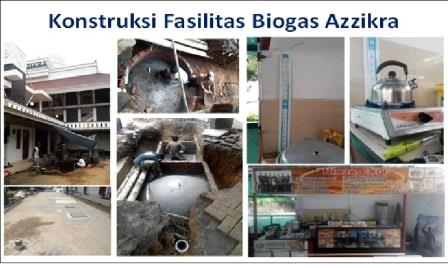
Santri boarding school and Azzikra Mosque Sentul are ecoMasjid pilot project programmes launched on February 19, 2016 jointly between Environmental Breeding and Natural Resources Institute of Indonesian Council of Ulama (Lembaga PLH & SDA MUI), the Ministry of Environment and Forestry, the Ministry of Health, Indonesian National Planning and Development (Bappenas), Indonesian Council of Mosques (DMI), and Indonesia Moves to Save the Earth (SIAGABUMI).
The structure of santri boarding school and the mosque occupy a total area of 12,600 m2 with a capacity to accommodate a total congregation of 10,040 people with 88 latrines and 162 wudu (ritual purification) facilities. On a normal conditions, the mosque accommodates a total of 300 people (excluding the congregation) consisting of the santri, ustadz (religious teachers), mosque personnel, and vendors. During its routine activities, the mosque produces both liquid and solid wastes. Liquid waste of the mosque is disposed to Cikeas river which certainly is prohibited by Islamic sharia as it leads to Cikeas river pollution.
Therefore, for quite some time, a study on liquid waste management has been undertaken together with relevant parties, including Agency for the Assessment and Application of Technology (BPPT) Serpong and Ministry of Environment and Forestry especially with regard to the selection of the most suitable technology. Available options include construction a Waste Water Processing Installation or constructing a biogas reactor. Following a careful study, it comes to the conclusion that liquid waste utilisation will be carried out using biogas technology with the following rationales:
- Construction and operation costs of Biogas reactor are more reasonable than Waste Water Processing Installation;
- Effective land utilisation. Biogas facility can be be buried below the earth thus it needs only a limited land use and aesthetically more pleasing;
- Produce methane gas as a source of renewable energy which may be utilised for cooking purposes;
- Reduce the effects of greenhouse gases;
- Support the implementation of zero waste concept and reduce unpleasant odour;
- Avoid the spread of the disease and environmental pollution;
Produce fertilisers which provide soil nutrient needs in a sustainable and ecologically friendly agricultural system.
What is a Biogas?
Biogas is one type of biofuel, a fuel originating from living matters and have the renewable characteristics. Unlike fossil fuels such as oil and coal, even though the early process of its formation involves living matter, however they are non-renewable as the formation of those fuels take millions of years.
Biogas is a gas produced through fermentation process of organic matters by bacateria on an anaerob conditions which take place inside the bio-digester. Biodigester is a tightly sealed and airtight chamber. Meanwhile organic matters are biodegradable materials thus biogas utilisation may be the solution of urban waste problems considering majority of the urban wastes consist of organic matters which may be recycled into biogas raw materials.
Naturally, biogas is present in swamps and rice paddies, produced by methanogenic anaerobic (organisms capable of producing methane which may survive only on anaerobic condition) of organic materials’ decomposition. Normally, all types of organic matters can be the source of biogas, but homogeneous organic materials, for example: cattle, pig, and human wastes, and organic materials with C/N ratio of 8-20 is the most suitable source for biogas. Biogas is composed of varioust types of gas predominantly by methane (55-75%) and carbondioxide (25-45%).
In addition to its remarkable potentials, the utilisation of biogas energy through biogas biodigester have many benefits, including effect reduction of greenhouse gases, minimising unpleasant odour, preventing the spread of the disease, generating heat and power (mechanical/electrical) as well as producing such byproducts as solid and liquid fertilisers. Utilising the wastes in this method economically are more competitive as the oil prices and anorganic fertilisers’ prices steadily increase. Additionally, zero waste principles are ecologically friendly and may lead to sustainable agricultural practices.
The Construction of Biogas Facilities at Azzikra
Construction of biogas facilities through endowment mechanism is made possible through collaboration between the Environmental Breeding and Natural Resources Institute of Indonesian Council of Ulama together with Yayasan Rumah Energi. During its initial stage, a-4m3 capacity biodigester has been constructed since February 8, 2017 where the gas utilisation has been continuosly supplied since March 23, 2017 to one of the cafetaria. The capacity of this biogas digester needs to be consistently improved to allow the processing and utilisation of the entire liquid waste produced by the santri boarding school and Azzikra mosque.
No significant problem was encountered during the construction project, with an exception to the underground pipelines. We praise the Almighty, that the selection of bio-digester construction did not involve pre-fabricated fibreglass, thus allow the dome construction to be installed below the pipeline.
Biogas may be utilised to the optimum level in an integrated manner and through its deployment in productive endeavours. Thus, biogas energy utilisation enable a wider impact while also enhancing productivity level, efficiency, and add values to the products. Biogas realisation generates not only worldly benefits but more importantly are their benefits in the hereafter as it eliminates harmful impacts of environmental pollution.
Written by: Dr. Ir. Hayu Prabowo (Head of Environmental Breeding and Natural Resources Institute of Indonesian Council of Ulama (Lembaga PLH & SDA MUI)
(Source: http://mui-lplhsda.org/wakaf-biogas-di-pondok-pesantren-dan-masjid-azzikra-sentul/)


